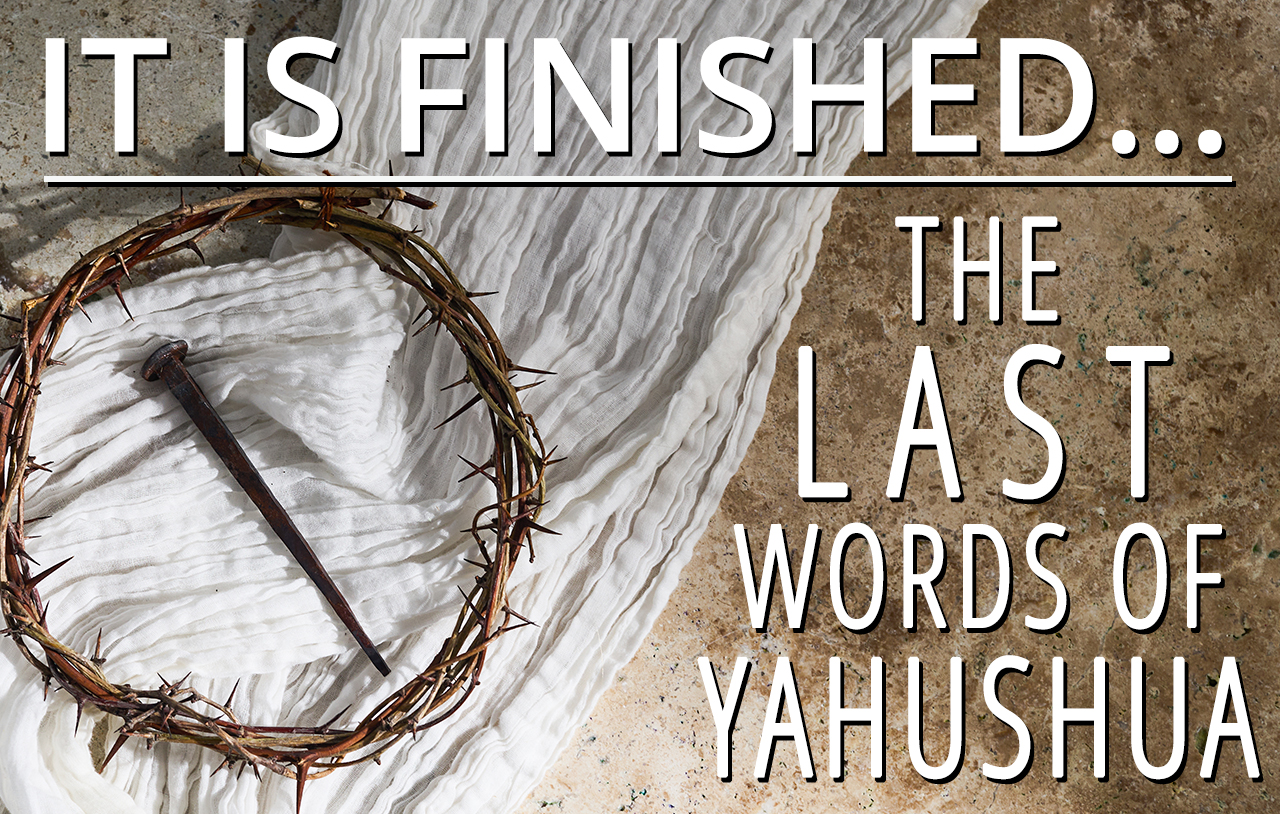
|
This is a non-WLC article. When using resources from outside authors, we only publish the content that is 100% in harmony with the Bible and WLC current biblical beliefs. So such articles can be treated as if coming directly from WLC. We have been greatly blessed by the ministry of many servants of Yahuwah. But we do not advise our members to explore other works by these authors. Such works, we have excluded from publications because they contain errors. Sadly, we have yet to find a ministry that is error-free. If you are shocked by some non-WLC published content [articles/episodes], keep in mind Proverbs 4:18. Our understanding of His truth is evolving, as more light is shed on our pathway. We cherish truth more than life, and seek it wherever it may be found. |

Yahushua knew that his mission was now finished, and to fulfill Scripture, he said, “I am thirsty.” A jar of sour wine was sitting there, so they soaked a sponge, put it on a hyssop branch, and held it up to his lips. When Yahushua had tasted it, he said, “It is finished!” Then he bowed his head and gave up his spirit. [John 19:28-30]
That phrase is the translation of one word, “tetelestai,” in the original language of the Bible. This rich and carefully chosen word is full of powerful meaning. Let’s explore some of its facets of significance.
Every Jewish person there would have instantly recognized this word as the equivalent of a Hebrew phrase that was used in the Old Testament sacrificial system. Each year, on the Jewish holiday called The Day of Atonement, the High Priest would enter into the temple and make a special sacrifice for the sins of the people of Israel. As soon as the priest had killed the animal, he would emerge from the place of sacrifice and declare to the waiting crowd, “It is finished” in Hebrew. In this sacrifice, all the sins of Israel were symbolically placed on the lamb that was killed and punished in their place. Yet the Bible teaches that this sacrificial system was never really complete or finished because the sacrifice of that lamb was imperfect and temporary. But when Yahushua died on the cross, he became the perfect and final sacrifice for all sin. The Book of Hebrews describes how Yahushua was the ultimate Lamb of Yahuwah, and by his sacrifice, the work of forgiveness was finally complete.
So, by saying, “It is finished,” Yahushua was signaling to the Jewish world that there was no more need for sacrifices or temples because his work brought ultimate fulfillment to what their sacrificial system foreshadowed.
|
He did not enter by means of the blood of goats and calves; but he entered the Most Holy Place once for all by his own blood, having obtained eternal redemption…But now he has appeared once for all at the end of the ages to do away with sin by the sacrifice of himself [Hebrews 9:12, 26]
So, by saying, “It is finished,” Yahushua was signaling to the Jewish world that there was no more need for sacrifices or temples because his work brought ultimate fulfillment to what their sacrificial system foreshadowed.
In New Testament times, when an employee completed a day’s work or project, he would tell his boss, “Tetelestai.” This signaled that whatever he was assigned to do was now completed. Similarly, when an artist would complete a piece of art, he would have a moment of unveiling where he would declare “tetelestai.” This, too, was to signal that his masterpiece was complete. No more touch-ups or adjustments are necessary. The work is done. When Yahushua came to this world, he told us his job was to provide salvation to a lost and broken world.
For the Son of Man came to seek and save those who are lost. [Luke 19:10]
In his last words, Yahushua communicated that the work he came for was accomplished. The task of earning the world's salvation was completed in his work on the cross. No more additions or adjustments were necessary—salvation was completed.
Maybe the most common use of “tetelestai” in Yahushua’s day was in debt collecting. When a person finally paid off a loan, they were issued a receipt stamped with the word “tetelestai,” meaning their debt was paid in full. This was verification that they were no longer responsible for any of that debt and that everything they owed was entirely and permanently paid for. The Bible says that our sin created a debt to Yahuwah and one that we could never pay back on our own. But when Yahushua died, he was paying off our debt of sin once and for all. Again, the Book of Hebrews describes the finality of Yahushua’s payment for our sins.
But our High Priest offered himself to Yahuwah as a single sacrifice for sins, good for all time. Then he sat down in the place of honor at Yahuwah’s right hand…And when sins have been forgiven, there is no need to offer any more sacrifices. [Hebrews 10:12-13, 18]
All of these nuances of tetelestai converge to communicate a beautiful truth—that Yahushua completed the work of salvation once and for all. That means it is not up to us to add anything, complete anything, or finalize anything when it comes to our salvation—Yahushua did it all. So now, when we have put our trust in the finished work of Yahushua, we can rest in confidence in our salvation and pursue Yahuwah with our whole hearts.
This is a non-WLC article by Micheal Maynard.
We have taken out from the original article all pagan names and titles of the Father and Son, and have replaced them with the original given names. Furthermore, we have restored in the Scriptures quoted the names of the Father and Son, as they were originally written by the inspired authors of the Bible. -WLC Team